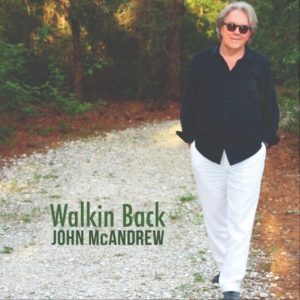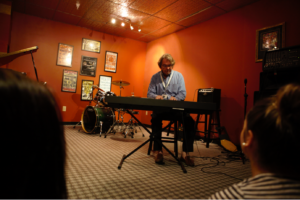When the wind dies down and the smoke begins to clear, I can see the damage done, facing my worst fears.” Those are the first few lyrics of John McAndrew’s title track “Walkin Back” and truer words have never been sung, at least when it comes to John’s struggles with drugs and alcohol.

“I’ve been in recovery from mental illness and substance abuse issues for a long time. The music is just a journey I think a lot of us go on. We kind of start in one place and we try to get better and better and then these things happen. A lot of the songs on the album are little instances and things that have happened on my journey,” said John.
I’m sitting down with John in my office at Cumberland Heights. He’s sipping on a diet coke, beaming with pride over the new album that paints a picture of the long road he’s been on – both literally and figuratively. John spent many years in a van driving from show to show – some gigs in dark bars with only the bartender in the audience. Other experiences include performing at the Minneapolis Metro-dome to a crowd of 70,000, and signing a record deal in Muscle Shoals. That success, he says, wouldn’t be possible without his new life.
The journey has helped John feel things he covered up for so long with booze and cocaine, allowing him to write a very touching song about his brother “Right Here With Me.” John’s brother Paul suffered from fetal alcohol syndrome, but went through most of his childhood undiagnosed. When he got older the family couldn’t take care of him, so Paul was sent to a group home and eventually passed away from cancer.
“It’s amazing that I can talk about it now because I just couldn’t talk about Paul before. I felt sad and regretful that I didn’t keep him from getting cancer or keep him from going through all the troubles he went through—group homes and all the medications. One morning while I was praying I was thinking about Paul and I was falling in the dumpster about it and then I heard this voice say, ‘Whenever he wasn’t with you he was with me.’ Then I fell really hard and so I decided to write a song about it. It’s what songwriters do. I wrote out the lyrics and played the piano a bit and decided to record the beginning, just something rough, and I turned on my machine to record it so I didn’t forget anything. Well, that’s the performance that is on this record, and then we added a six- string base and cello afterwards. You know, that happens once in a while, so I think it’s my favorite song on the record because of the truth in it,” said John.
Here are some of the song lyrics: “Wishin’ I could have kept him from any pain at all. But God told me this mornin’ there’s so much you did not see, all those days he laughed and smiled with joy beyond belief. Those days we played with angels and life for him was a breeze. On those days he was without you he was right here with me.”
That raw experience John had writing “Right Here with Me” is very similar to so many other moments he’s witnessed with patients here at Cumberland Heights. As the music-assisted therapist, he talks a lot about music and the brain. When you come into treatment, you cover a lot of ground on a day to day basis – group therapy, individual therapy and learning about the disease of addiction, so when you get the patients down to the music room and allow them to let go and find themselves in the music, you’ll see real breakthroughs.
“To watch somebody whose feelings and emotions have been covered up for so long and medicated in one way, shape or form, and then see them express themselves through song, and tell the true story of their life, it’s pretty amazing,” said John.
But getting patients to that point isn’t always easy.
“It doesn’t matter if people have been playing music for four weeks or 45 years. We get people in Cumberland Heights who are professionals and have been performing for thousands and thousands of people, and then there’s those who have never picked up a guitar or sang in front of anyone. But they all get the chance to perform in the talent show on Spiritual Emphasis Day, and both the novice and professional get equally nervous. I remember a patient who had never played music before and he wrote his first song about his dad. He wrote that song about his dad because he himself has a son, but he couldn’t put that all together until he finished the song. So, he gets up to play in front of the auditorium and his hands are shaking and he says, ‘I don’t think I can do this’ and I say, ‘You have to.’ So, he plays, and the patients are on their feet and they love and support him. He made a commitment to recovery when he chose to perform out loud. Then, a little while later, this big shot comes up to do his song, and his hands are shaking and he’s saying, ‘I don’t think I can do this’ and I say, ‘You have to’ and he plays. So, when we use music and art to let people tell their story, to drain their souls, and I get to be a part of it, I’m just reminded of what an amazing job I have, and I am so grateful,” said John.
This is also where the album comes in, because it’s John’s hope to reach even more people struggling – not just with substance abuse, but other hardships.
“If someone is going through something that is really difficult I hope they hear a song or two that gives them some peace and comfort for a while,” said John.
The work on Walkin Back started about two years ago in Los Angeles. There are quite a few notable musicians on it including Michael Landau who is part of James Taylor’s All-Star Band, Luis Conte, also part of Taylor’s All-Star Band and Chris Leuzinger who plays with Garth Brooks. It’s co-produced by Chris Cibelli and mixed and mastered by Craig Bauer.
“All of these people are so gifted and talented – they know how to do this stuff. You have to be surrounded by a whole lot of people to do anything decently,” said John.
You can download the album by heading to JohnMcAndrew.com or Inthishour.org It’s also on all major streaming sites.
“For anyone listening to this album, I hope they leave with the impression that these are true stories, every song is honest and that we are all so much the same. I hope it gives them a sign of relief or comfort. And then I hope they share it with somebody else,” said John.










